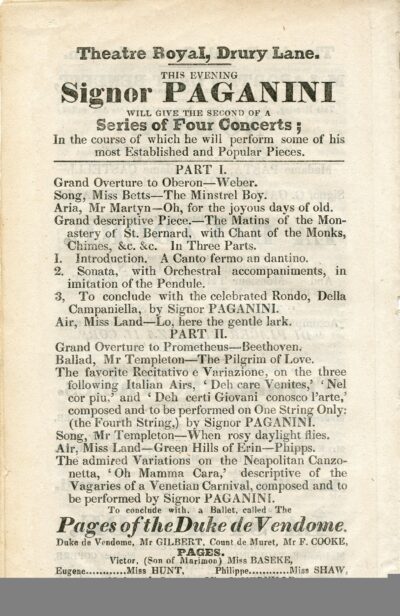
1833 London Concert Advertisement
- $1,725
Issue no. 3610 of The Theatrical Observer; And Daily Bills of the Play, a daily periodical published in London. Dated Friday, July 12, 1833. 4 pp. The final page consists of a large advertisement for a concert at Drury Lane with the header, "This evening / Signor PAGANINI / Will give the second of a Series of Four Concerts; In the course of which he will perform some of this most Established and Popular Pieces." The program includes The Matins of the Monastery of St. Bernard. Among other contents of the publication, a review of a performance of Bellini's La sonnambula with Maria Malibran as Amina at Covent Garden stands out (p. 1): "Her performance was marked by all that is beautifully impassioned in acting, combined with the most touching musical expression, and the most brilliant execution; she was, come a l'ordinaire, rapturously and vehemently applauded."8.25 x 5.25 inches (21 x 13.5 cm). Upper edge slightly frayed; small hole to head of second leaf covered with tape. Otherwise, in very good condition.The legendary Italian violinist, violist, guitarist and composer Paganini, embodiment of early nineteenth-century virtuosity and as such a model not only for other violinists but also for Franz Liszt, traveled to London four times between 1831 and 1834. The concert advertised here belongs to his third journey. Maria Malibran, nà e GarcÃa, from the famous GarcÃa dynasty, was one of the most celebrated opera singers of her time.
More from Schubertiade Music
All about Eve” â” Signed Photograph
Signed promotional still from the 1950 film distributed by 20th Century Fox, a headshot of the American actress in the lead role of the movie. 10 x 8 inches (25.4 x 20.4 cm). Lower right corner slightly bumped, else fine. The 1950 American drama film written and directed by Joseph L. Mankiewicz, and produced by Darryl F. Zanuck is based on the 1946 short story "The Wisdom of Eve" by Mary Orr. The film stars Bette Davis as Margo Channing, a highly regarded but aging Broadway star, and Anne Baxter as Eve Harrington, an ambitious young fan who maneuvers herself into Channing's life, ultimately threatening Channing's career and her personal relationships. The film held its world premiere in New York City on October 13, 1950 and was praised by critics at the time of its release, receiving a record 14 Academy Award nominations and winning six, including Best Picture. All About Eve is the only film in Oscar history to receive four female acting nominations (Davis and Baxter as Best Actress, Holm and Ritter as Best Supporting Actress). Widely considered as among the greatest films of all time, in 1990, it became one of 25 films selected for preservation in the United States Library of Congress' National Film Registry, deemed "culturally, historically, or aesthetically significant".From the collection of Paul McMahon, a critic, photographer and artist who worked for more than 13 years touring with Marlene Dietrich as the iconâs stage manager, announcer, dresser, secretary and escort, and later spent 25 years as an arts and entertainment reviewer and photographer with Gay Community News, Esplanade, Tommyâs Connection, The Mirror, Bay Windows and other publications.Signed Photograph
Signed candid photograph of the actress donning white gloves, ca. 1940s. 3.5 x 2.5 inches (9 x 6.5 cm). In good condition; frame slightly skewed versus edges.From the collection of Paul McMahon, a critic, photographer and artist who worked for more than 13 years touring with Marlene Dietrich as the iconâs stage manager, announcer, dresser, secretary and escort, and later spent 25 years as an arts and entertainment reviewer and photographer with Gay Community News, Esplanade, Tommyâs Connection, The Mirror, Bay Windows and other publications.Portrait Photograph Signed
Large half-length portrait photograph of the Czech composer and conductor in formal attire by Langhans in Prague, signed on the photographer's mount "Jar. KÅiÄka 1936" with printed Langhans logo to lower margin. Size of photograph 8.75 x 6.25 inches (22.5 x 16 cm); size of mount 13.5 x 10.5 inches (34 x 26.5 cm). Mount browned and somewhat worn; small tear to right edge, else fine. KÅiÄka was an influential figure in Czech music life, particularly as a teacher. After completing his studies in Prague in 1905, he taught in Ekaterinoslav, Russian Empire (now Dnipro, Ukraine) for a year and befriended Alexander Glazunov and Sergey Taneyev before returning to his native country. Within his output as a composer, music for children, including children's operas, occupies a special place.The Winters Art Lithographing Company’s Popular Portfolios of the World’s Columbian Exposition.
Booklet illustrated with 15 color lithographs, unpaginated (32 pages), 6 1/4 x 9 1/4 inches, textured paper, cord binding. Delicate and richly colored illustrations with glossy highlights by Charles Graham showing all aspects of the World's Columbian Exposition. Of particular note is the centerfold "Birdseye View of Grounds and Buildings. Columbian Exposition, Chicago,1893." The fourteen other color illustrations feature the Electrical Building, Horticultural Building, Woman's Building, and so on. This booklet was distributed by the Philadelphia cloth merchant Henry W. Green & Co. and was published in 1891, looking ahead to the opening in 1893. Extensive staining, nicks, corner creases, some dampstaining, two leaves with significant tears, front cover stained and separated from spine. A worn copy of a beautiful publication.Typed letter signed to Manuel Rosenthal
TLS of the American composer to Manuel Rosenthal, one of the most influential and respected French conductors of the 20th century. New York, December 24, 1975. 1 p. On Thomson letterhead paper. In full: "Cher Manuel, Le Temple de Mà moire is of the utmost beauty and I long to hear it in sound. / A thousand thanks for sending it to me and a thousand wishes for happy and prosperous times and more of them for all or you. Affection ever, Virgil." 8.5 x 5.5 inches (21.5 x 14 cm). In fine condition.Le Temple de Mà moire is a song for mezzo soprano or baritone and orchestra, composed in 1975 and Rosenthal's last work. The French composer and conductor held leading positions with musical organizations in France and America. He was friends with many of his contemporary composers, and despite a considerable list of compositions is mostly remembered for having created the popular ballet score Gaîtà Parisienne and left a varied legacy of recordings. Rosenthal's ties with many French composers, and especially with Maurice Ravel, gave him an unrivalled authority in the contemporary French repertory. "In 1926, Ravel invited him to bring him some of his compositions. From being one of Ravel's rare pupils, Rosenthal soon became a friend, and he left moving tributes to the maître in articles and interviews, as well as the book Ravel: Souvenirs De Manuel Rosenthal (1995). Rosenthal tried to emulate Ravel's example of perfectionism, with memories of many a laboriously completed exercise torn up and dropped in Ravel's waste-paper basket.It was Ravel who decided Rosenthal's future as a conductor. In 1928 he persuaded the Concerts Pasdeloup to devote a concert to Rosenthal's works and to engage him to conduct it. Never having been on a rostrum before, Rosenthal was terrified, but among those impressed was the celebrated conductor Dà sirà -Ãmile Inghelbrecht; when he founded the French National Orchestra in 1934, he took on Rosenthal as his assistant." (Roger Nichols, The Guardian, "Manuel Rosenthal: Obituary," June 8, 2003).- $173
- $173
Joint Autograph Letter Signed
Autograph letter to "Fiorentino" by Francesca Cecchina Thalberg, wife of the famous Austrian pianist and composer, with a postscript by Sigismund, signed by both. In French. 4 pp. Small bifolium. No date. "My dear Fiorentino, so much has not been said, but all will be said on Saturday, July 22, at noon. We will leave for Brussels immediately and then go to [Bad] Ems." Rome and Naples are identified as later destinations. "If you, as I hope, send us some nice words to cheer us up, send them in May, and address them to Mme. T., Bad Ems, Duchy of Nassau." Sigismund's postscript: "It is impossible to write or to say the smallest nice or spirited word after Cecchina. Thus all I can do is to shake your hands cordially." In fine condition. 7 x 4.5 inches (18 x 11.3 cm).- $288
- $288

Autograph Letter Signed – “We have arrived in the beautiful country of Italy!”
ALS of the notable German pianist-composer, then based in Paris to Carlo Severini, stage director of the Parisian Thêatre Italian, in Bologna. In French. Turin, June 10, [18]37. 2 pp. Bifolium (address on p. 4). In full: "We have arrived in the beautiful country of Italy! The poor weather that ruled for a long time, combined with some important business, delayed our trip by a month. We expect to stay here for two days to listen to some operas, and then we will move on to Milan. If you, by chance, find an opportunity to engage Mlle. Francilla for Lurques [?] or Pisa in the course of the summer, we would appreciate that very much. The season of the other [Italian] states, such as Reggio [Emilia] and Padua are already over or will close soon, it is not worth the effort. â" In any case, I have the courage to hope for a response due to your kindness, and I will immediately go to the post office when I arrive in Milan. Francilla and I ask you to accept our most distinguished feelings, and to remember us to Monsieur Rossini that we are looking forward to a reunion in the near future and with you as well. Your devoted servant J. P. Pixis." Francilla Pixis, born Franziska Helma Gà hringer (1816-1888), Pixis's foster daughter, was then a rising star among opera singers (mezzo soprano); she also studied with Henriette Sontag and Fernando Paër. Small hole to first leaf; piece of outer edge of of integral address leaf cut off, overall fine. 7.75 x 4.75 inches (19.7 x 12 cm).- $316
- $316

Autograph Letter about early productions of Rienzi and Tannhäuser
Important autograph letter signed ('Richard Wagner') to [the composer and conductor] Wilhelm Taubert (1811-1891), musical director of the Berlin Royal Opera, Dresden, December 11, 1847, 3 pages, 4to. With the attached integral address leaf and the remnant of the original red wax seal. Minor paper restoration to the seal tear, overall very fine. With a transcription and translation. A richly detailed letter by the 34-year old Wagner about early productions of Rienzi in Berlin and Tannhäuser in Dresden. Translated in full:"Due to a report from a lady friend I have heard of a performance of my Rienzi on the 3rd of this month. I have been assured by the report that despite the audience being so cold, the singers and especially the conductor wouldn't be diverted in the least from their enthusiasm and for this reason the entire performance turned out to be an excellent one. Both are said never to have worked so well before. I implore you to please give my best regards to the dear singers who are said to have shown so much affection for the performance that evening, despite the lifelessness of the audience. Their faithful acclamations at the Berlin synagogue that I have forfeited. If i am not mistaken, the performance I am talking about took place at the insistence of the king, whom I had asked to protect my interests. If there is anything more that can be done for the opera, it might be in having it performed once more on a Sunday. As far as I know Herr von Küstner has given his friend Lachner the advantage of Sundays, in full awareness and with great indefatigability. As my opera has never been performed on a Sunday, Herr Küstner ought to consider my request right and fair. After having denounced him to the king, so to speak, I cannot very well approach him personally. Neither can i so quickly request another order for his manager from the king, can I? Accordingly, I only have recourse to you and the worthy singers of my opera. Perhaps you could, as mediator, manage to succeed in having Rienzi performed on one of the following Sundays. Do look and see what you can do. Moreover, I am not worrying much about the absence of success in Brandenburg. I have too much respect for Berlin to recite her the reason for my calmness. By comparison, the prosperity of our opera in Dresden gives me ever increasing joy: it was a lovely revenge for me to present a splendid performance of Tannhäuser here to your king recently. He was very impressed and he told me, among other things, that he would not demand a performance of this opera in Berlin from me, under the present circumstances. (Naive enough!!). How is your gullible colleague Palestrina? I meant to say Nikolai? Is he still frequenting the royal table, supplying clerical conspiracies? Many blame him for the Prussian diplomatic note to Switzerland -- I cannot believe that his influence also goes as far as to the cabinet. If you see him, don't give him my regards. Concerning our concerts, I think I can manage now; soon you will hear something about it. By the way, nothing could have been more beneficial to me than the gossip which seemed so idle to me then, and which really annoyed me and harassed me in Berlin.: You know, regarding my imaginary engagement in Bern. My manager cannot be talked out of the idea that upon returning to Dresden, I had vigorously torn myself away from a great temptation in Berlin. He treats me with utmost gratitude and praises my loyalty. You see, how well the Swiss can provide for a person. It is really very funny! Well, my dear Taubert, let me hear from you sometime -- that will please me very much. Receive again my sincere thanks for your friendship, and the services you have rendered me. Please give me an opportunity to reciprocate. My wife sends you her kindest regards. Farewell, and remember me in good humor."Wagner's financial circumstances did not greatly improve, even after the 1844 publication of his first three opera scores (Rienzi, the Flying Dutchman- $9,775
- $9,775
Falstaff” Autograph with Musical Quotation
Small oblong leaf with musical quotation on one hand-draw staff, three measures with heading, "Falstaff Atto 1mo" (it is the beginning of Verdi's opera); below: "Arturo Toscanini / Wien 19-5-[1]929." 4.5 x 7 inches (11.5 x 17.5 cm). In fine condition."When Toscanini finally brought the La Scala company to Vienna, in 1929, the twenty-one-year-old Herbert von Karajan attended a performance of Verdiâs âFalstaff,â and later recalled, âFrom the first bar, it was as if I had been struck a blow. I was completely disconcerted by the perfection that had been achieved. The agreement between the music and the stage performance was something totally inconceivable for us.â âFalstaffâ was Toscaniniâs favorite opera, but he also revealed the structural integrity and dramatic distinction of the mid-period Verdi worksâ"âRigoletto,â âIl Trovatore,â âLa Traviataââ"that were considered tired and old hat when he was young. After Toscanini, people stopped condescending to Verdi." (David Denby, "The Toscanini Wars," New Yorker Magazine, 7/3/2017)- $863
- $863
Collection of Letters to Manuel Rosenthal
An important collection of 21 letters addressed to the third and final student of Ravel, Maurice Rosenthal, composer and one of the most influential and respected French conductors of the 20th century. All in French, details and translations as follows:Auric, Georges (1899â"1983), French composer, member of Les Six. 3 ALS:1. [Paris,] dated "Saturday night." 1 p. On letterhead paper with Auric's address. Auric thanks Rosenthal for "miraculously rejuvenating" his "poor old Volponà ." "It was impossible for me to review these hastily written pages whose weaknesses you have been able to fathom." He includes a check with his letter to pay Rosenthal for his service. 8.25 x 5.25 inches (21 x 13.5 cm). In very good condition. As there is no work by Auric with that title, Volponà , it remains unclear what work the letter refers to. 2. [Paris,] dated "Wednesday morning." 1 p. On letterhead paper with Auric's address. Auric comments on a broadcast performance of Rosenthal's Saint François d'Assise that he listened to with great pleasure. "It seems to me as if the work had grown with age. It moved me deeply." 8.25 x 5.25 inches (21 x 13.5 cm). In very good condition. Saint François d'Assise was composed in 1936â"39. 3. Paris, no date [after 1972]. 1 p. Sender's address in manuscript to head, with post-1972 postal code. Auric congratulates Rosenthal on a new work whose score Rosenthal had sent him. "It is a beautiful work (which would have fascinated Maurice Ravel) and that surprised me by some renewal of your inspiration. Just reading [the score] proves the stupidity and boorishness of the 'princes' (!) on our current radio." 8.25 x 5.25 inches (21 x 13.5 cm). In very good condition. The work discussed here is probably Le temple de mà moire (1975) for mezzo-soprano or baritone and orchestra, which is Rosenthal's only substantive composition from after 1972.Caby, Robert (1905â"1992), French composer and writer. ALS, Paris, October 12, 1975. On Caby's letterhead paper. "The other night, I have heard the work you wrote in memory of Ravel. / Do I Have to tell you that I was not surprised by the [illegible] of the reviews? For of course you do not belong with the band of masters who make the laws in music they like to call 'contemporary' in order to [illegible] it completely. I was sure that your work has no weight in the eyes of these gentlemen compared to the ingenious creations of Messrs. Stockhausen and ersatz and Co. and of poor John Cage." He goes on to praise Rosenthal's work and its orchestration in particular. 11.75 x 8.25 inches (29.5 x 20.8 cm). In fine condition. The composition by Rosenthal discussed here is probably Le temple de mà moire, first performed a few days before (see also Yvonne Gouvernà 's letter, below). Caby was Erik Satie's executor. He is best known for his editions of Satie's unpublished works. His own music has been rarely performed.Cassou, Jean (1897â"1986), French writer, poet, and art critic. 3 ALS:1. Paris, September 27, 1975. 2 pp. Appreciative comment on an unidentified composition by Rosenthal on a text by Cassou. "I was particularly satisfied by seeing myself set to music by a great artist, and I admired and still admire his heart and talent. And my joy will be. confirmed because I will hear us. Attached please find my form for SACEM." 11.75 x 8.25 inches (29.7 x 21 cm). Slightly browned along folds, otherwise in good condition. SACEM (Socià tà des auteurs, compositeurs et à diteurs de musique is a French professional association collecting payments of artistsâ rights and distributing the rights to the original composers, authors of texts, set to music, and music publishers.2. Geneva, August 17 [no year; postmark illegible]. 1 p. Aerogram-style stationery of Hà tel-Pension Lamartine, Geneva (outside with photograph of Geneva at night). Cassou appreciates a program for an evening that Rosenthal sent him and writes about his travel plans.3. Paris, "21st"; no month or year. 2 pp. Letterhead paper- $2,875
- $2,875
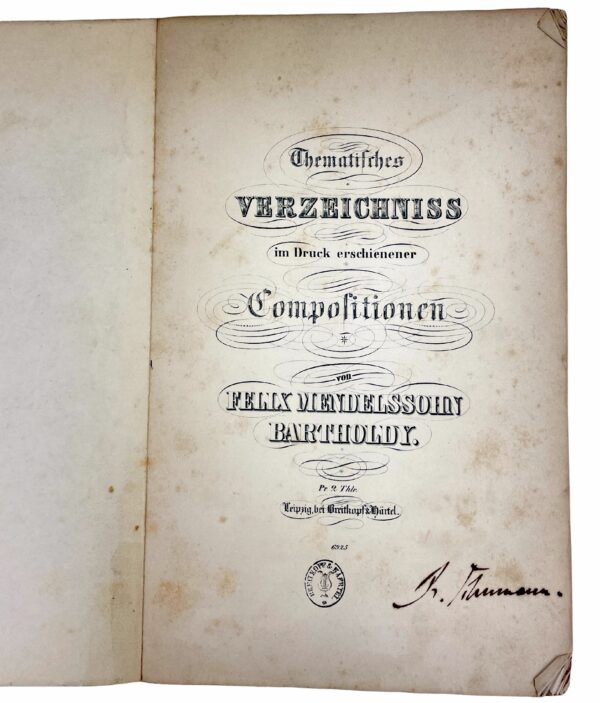
Thematisches Verzeichniss im Druck erschienener Compositionen von Felix Mendelssohn Bartholdy” – THE COPY OF ROBERT SCHUMANN
8vo. Title (vb); 1-61 pp [compositions with Opus number 1-100]; 63-64 pp [half-title]; 65 - 69 pp ["Compositionen ohne Angabe einer Opuszahl"]; 70p. ["Büsten, Medaillen, Portrais und sonstige Abbildungen"]; 71-73 pp. ["Systematisch geornetes Verzeichnis"]; 73 - 81 pp. [Verzeichniss.Gesangwerken gehà rigen Texte."]; 81-83 pp ["Lieder und Gesänge"]; 84 p. ["Dedicationen"]. Cover and title lithographed, otherwise engraved throughout. [PN] 6925. Title signed "R. Schumann" in ink to the lower right corner. Covers somewhat toned, lower right cover corner torn and lower right corners well thumbed through page 35. A few unopened leaves towards the end, scattered foxing throughout, else fine. A historic copy of the Mendelssohn Thematic Index, owned and signed on the title page by Robert Schumann, who regarded Mendelssohn as the greatest of his contemporaries. This is the second printing of the first edition which was prepared with the assistance of Mendelssohn himself in 1846, and is identical but for the change of price (1 Thlr changed to 2 Thlr). Reference: R. Elvers, Felix Mendelssohn Bartholdy. Briefe an deutsche Verleger (Berlin, 1968), p. 354."When it came to his contemporaries, Schumann reserved his highest praise for Mendelssohn, whose string quartets.counted among the few recent efforts worthy of late Beethoven. As indicated in a long diary entry of October 1842, Schumann was heartened by his colleague's warm praise for his own newly composed quartets.'for Mendelssohn is a formidable critic; of all living musicians, he has the sharpest eye.' Schumann's dedication of the quartets 'to his friend Felix Mendelssohn-Bartholdy with heartfelt respect' may thus be taken as an outward sign of his deep admiration for a composer whose approbation he avidly sought." (John Daverio, "Robert Schumann," p. 253)- $9,775
- $9,775
Skyray – Film Score” – Unpublished Autograph Musical Manuscript
Folio (ca. 360 x 260 mm.). Unbound. Autograph title page; 5 pp musical manuscript notated in ink and pencil on 3 leaves of 20- stave music manuscript paper. An unpublished manuscript, composed at the age of 14, primarily written in 2 different inks, with a handful of additions, alterations and cancellations in pencil. Title page inscribed "for my *friend TONY COOKE / SKYRAY - film score / by / Stuart Oliver Knussen / Short Score - complete / 14 Numbers!!" and at the foot "*Dear most illustrious, brilliant and implacable or malicious Joe (i.e. fiend) of a fiendish friend." Titled, dated, signed and notated further at the head of the first page of music: "SKYRAY music to the film," "12th March 1966," and "produced by J.A. Cooke assisted by S.O. Knussen and S. Hughes / Stuart Oliver Knussen." First leaf, recto and verso, including 82 measures of music in orchestral short score for parts one through seven, including timings: 1 ("1 Introduction 30"); 2 (T.E.P. 10"); 3 ("Shot New Theme 20"); 4 ("Jazz Cpt To Skyray Theme"); 5 ("Asteroid leaves SKYRAY 20"); 6 ("T.E.P."); 7 ("E.S.M. 50"). Second leaf, recto, including 28 measures of music in orchestral short score for parts eight through thirteen: 8 ("Climax 3"'); 9 ("Space Music. 25"); 10 ("Attack Preparations. 22 1/2 secs"); 11 ("Repeat Introduction Slower, but FF - Victorious Music. 30"); 12 ("Repeat Theme with 'Pop' group ad. lib"); 13 ("Humorous Endings 5"). Third leaf, recto and verso, titled additionally at the head "a puppet film produced by Tony Cooke, filmed in Cooke-process marionation, MARVELDRAMA / SKYRAY -film score / Piano Version (Short Score) and Orchestral Incidental Music," signed again "Stuart Oliver Knussen" and dated "begun March 12th 1966" and (in a different ink) "finished June 24th 1966 (in a new ink!!)" and including 22 measures of music scored in ink for Piano 1 and 2 and Drums, with additional instrumental annotations in pencil ("trb," "cello," "Trp"), for part 14 ("Theme and Skyray Lift-Off"). In very fine condition throughout. The dedicatee and credited "producer" of the present work, Tony Cooke writes in an email that "Way back before time started, during my time in London, I was Oliver Knussenâs best friend. We spent our weekends hanging out together in music stores, attending rehearsals and concerts, and digging endless musical materials he and his dad had accumulated over the years. Ollie was very precocious, and, of course, went on to have a very illustrious career. I was present in the Royal Festival Hall when he conducted the premiere of his First Symphony with the LSO.He and I were mostly out of touch ever since we became adults, because I moved to the US, and Ollieâs life had already grown very complicated. We had a wonderful 2-hour phone conversation in the middle of the night a few years back, and I believe that was the last time we were in direct contact. He seemed the same as ever, but did share with me that he had some major health concerns. Of course, it was a blow to find out since that he had died in 2018â"not so long after our phone conversation."Oliver Knussen was a towering figure in contemporary music, as composer and conductor, teacher and artistic director and created a body of work characterised by its crystalline concision, complexity and richness. He studied composition with John Lambert in London and Gunther Schuller at Tanglewood and was just fifteen when he wrote his First Symphony (later conducting its premiere with the London Symphony Orchestra) whilst his Third Symphony (1973-9), dedicated to Michael Tilson Thomas, is now widely regarded as a twentieth-century classic. A number of dazzling ensemble works, including Ophelia Dances (a Koussevitzky centennial commission, 1975) and Coursing (1979), cemented Knussenâs position at the forefront of contemporary British music and many of his works have entered the standard International orchestral and soloist repertoire. In the 1980s, Knussen collaborated with Maurice Senda- $12,075
- $12,075
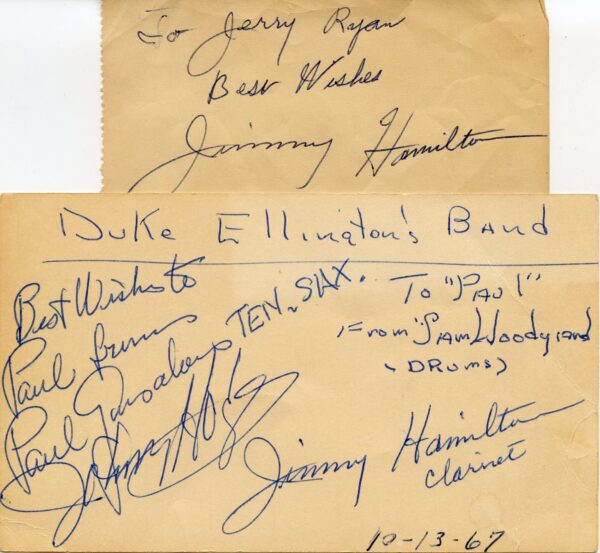
Set of 1967 Autographs from Duke Ellington’s Band
[Duke Ellington Band] Hamilton, Jimmy. (1917-1884) & Woodyard, Sam. (1925-1988) & Gonsalves, Paul. (1920-1974) & Hodges, Johnny. (1907-1970) A set of 5 autographs from the Duke Ellington band on two small pieces of paper, one dated 10/13 1967, the first signed from clarinetist Jimmy Hamilton and inscribed "To Jerry Ryan, Best Wishes"; the second identified "Duke Ellington's Band" in an unknown hand and signed with "Best wishes to Paul from Paul Gonsalves Ten. Sax," "Johnny Hodges," "To 'Paul from Sam Woodyard (Drums)" and "Jimmy Hamilton, Clarinet." 5 x 3 inches; 3.75 x 2.8 inches. Toned, else fine.- $288
- $288
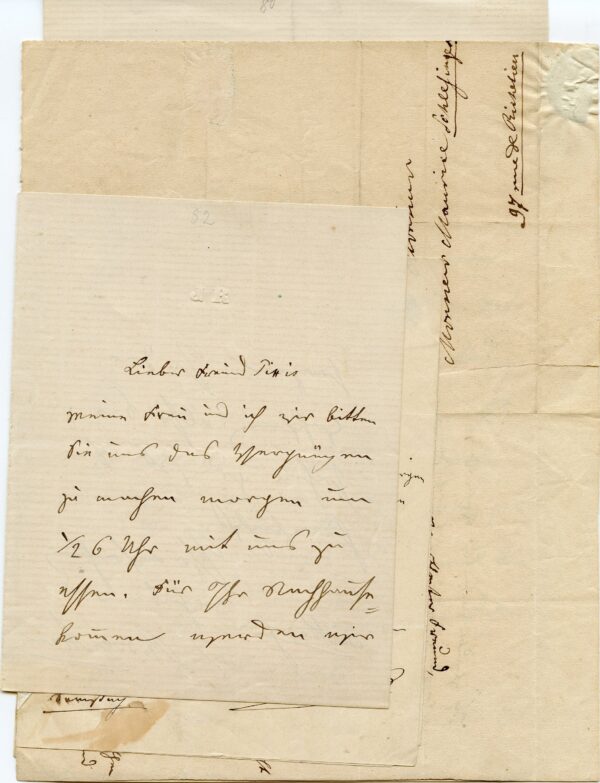
Six Autograph Letters Signed
An intriguing collection of letters from the German Jewish pianist and composer, who lived in Paris from 1837 to 1870. 1. To German composer and pianist Johann Peter Pixis. In German. 2 pp. Small bifolium with blind stamped monogram "JR." Dated "Wednesday." "Dear friend Pixis, my wife and I ask you to please us by having dinner with us tomorrow at half past five. We will take care of your return home." 5.25 x 4 inches (13.3 x 10.5 cm).2. To Johann Peter Pixis. In German. 1 p. Small bifolium. Dated "Saturday." "Friend Pixis, I ask you to please us by having dinner with us tomorrow Sunday at three. You must agree to make us really happy." 5.5 x 4.25 inches (13.6 x 11 cm).3. To the publisher Maurice Schlesinger (1798-1871). In German. 2 pp. Small bifolium. Dated "Wednesday." Address to final page, establishing the recipient, who is not mentioned in the letter itself. "Most worthy friend, I prefer to turn to you in writing rather than discuss my cause orally once more. I set the price of my etudes for two reasons, which does not allow me to depart from it even more. 1) Because they have been written for a publisher [i.e. Schlesinger] with whom I desire very much to enter a permanent business relationship. 2) Because they are for a man whom I hold in high esteem and who is very kind. Therefore I believed I would have to demand less from you than I would have demanded from anybody else, but I must insist on the price of 800 francs. Be so kind to answer within a few days. I will not offer my etudes to anybody else until then." 3.75 x 6 inches (15.5 x 9.8 cm).4. To unidentified male recipient. In German. 2 pp. Bifolium. Dated "Wednesday evening." "Rest assured that I thought of you quite often, but I did not come because I was not able to. I was a prisoner to my bed and home for three months. Now I am doing better. I took a few coach rides, weather permitting, but I haven't taken any walks so far. Thus I cannot hope to get permission to visit you as soon as I would like to." 8.25 x 5.25 inches (21 x 13.5 cm). 5. To "Monsieur Anders". In German. 2 pp. Bifolium. Dated "Wednesday." Address, "Monsieur Monsieur Anders en ville [Paris]," to final page. "I don't know how I can apologize to you. I am so extremely sorry for letting you wait in vain. I had more things to do than I thought, and thus it happened that I completely forgot about my meeting with you. Only today [.] people reminded you of it." The recipient could be the German painter Friedrich August Anders (1826-after 1856), who lived in Paris in the 1850s and probably after as well. 8 x 5.25 inches (20.2 x 13.5 cm).6. To unidentified recipient (probably a diplomat). In French. 3 pp. Bifolium with blind stamped monogram "JR." Baden (Grand Duchy) [now Baden-Baden], August 12, 1865. "A bit more than two months ago I received a letter from Madrid (copy attached) from the Ministry of the State telling me that Her Majesty the Queen [of Spain] has bestowed the order of Isabella the Catholic on me. I have not received either the diploma or the insignia ever since. I would be very much obliged to you, Monsieur, if you were so kind as to complain on my behalf and let the French ambassador in Madrid intervene. I think you are in a business relationship with him." The aforementioned copy of the letter from Madrid, on a single leaf of the same paper, is attached. It is in Spanish, dated June 4, 1865, and signed "A. Benavide." 7.75 x 5 inches (19.8 x 12.5 cm).Rosenhain began his career in Frankfurt, and then moved to Paris in 1837 by way of London. In Paris (where he remained for over thirty years), he became a prominent figure in the musical scene, particularly through his chamber-music evenings, attended by Cherubini, Rossini and Berlioz. During his over eighty-year life, Rosenhain composed in many genres, including four operas, an oratorio and three symphonies. He also wrote many other orchestral and chamber pieces, and a plethora of works for solo piano, including variations based on famous- $1,380
- $1,380
Typed letter signed to Manuel Rosenthal
Mitropoulos, Dimitri. (1896â"1960) [Rosenthal, Manuel. (1904â"2003)] TLS of the Greek-born American conductor, then music director of the New York Philharmonic, to one of the most influential and respected French conductors of the 20th century. No place [New York?], October 29, 1953. 1 p. On Mitropoulos letterhead paper (watermark from Eaton's). Mitropoulos declines a request from Rosenthal to perform his (only) symphony, "I feel really ashamed to have to refuse such a thing to a musician of your calibre by telling you that for a long time to come I cannot consider any more new works." 7 x. 7.25 inches (18 x 18.5 cm). The unusual, slightly oblong format is the result of the blank bottom of the page having been torn off. Two punch holes to left margin. Otherwise in good condition.The French composer and conductor held leading positions with musical organizations in France and America. He was friends with many of his contemporary composers, and despite a considerable list of compositions is mostly remembered for having created the popular ballet score Gaîtà Parisienne and left a varied legacy of recordings. Rosenthal's ties with many French composers, and especially with Maurice Ravel, gave him an unrivalled authority in the contemporary French repertory. "In 1926, Ravel invited him to bring him some of his compositions. From being one of Ravel's rare pupils, Rosenthal soon became a friend, and he left moving tributes to the maître in articles and interviews, as well as the book Ravel: Souvenirs De Manuel Rosenthal (1995). Rosenthal tried to emulate Ravel's example of perfectionism, with memories of many a laboriously completed exercise torn up and dropped in Ravel's waste-paper basket.It was Ravel who decided Rosenthal's future as a conductor. In 1928 he persuaded the Concerts Pasdeloup to devote a concert to Rosenthal's works and to engage him to conduct it. Never having been on a rostrum before, Rosenthal was terrified, but among those impressed was the celebrated conductor Dà sirà -Ãmile Inghelbrecht; when he founded the French National Orchestra in 1934, he took on Rosenthal as his assistant." (Roger Nichols, The Guardian, "Manuel Rosenthal: Obituary," June 8, 2003).- $288
- $288
Signed photograph to Manuel Rosenthal
Kempff, Wilhelm. (1895â"1991) [Rosenthal, Manuel. (1904â"2003)] Signed photograph of the German pianist by Harcourt, Paris, inscribed to Manuel Rosenthal, one of the most influential and respected French conductors of the 20th century. In white ink, translated from the French: "Manuel Rosenthal â"souvenir of the unforgettable concerts in Rio and Buenos Aires (Beethoven, Schumann, Brahms) Cordially Wilhelm Kempff August 15, 1951 Buenos Aires." "Wilhelm Kempf [sic] Paris 1952" in unknown hand to verso, contradicting the date in the inscription. 9.25 x 7 inches (24 x 18 cm). In very fine condition. An interesting association. Kempff, compromised by his collaboration with the Nazi regime, was eager to reconnect with artists from the allied countries and with Jewish artists in particular after the war.The French composer and conductor held leading positions with musical organizations in France and America. He was friends with many of his contemporary composers, and despite a considerable list of compositions is mostly remembered for having created the popular ballet score Gaîtà Parisienne and left a varied legacy of recordings. Rosenthal's ties with many French composers, and especially with Maurice Ravel, gave him an unrivalled authority in the contemporary French repertory. "In 1926, Ravel invited him to bring him some of his compositions. From being one of Ravel's rare pupils, Rosenthal soon became a friend, and he left moving tributes to the maître in articles and interviews, as well as the book Ravel: Souvenirs De Manuel Rosenthal (1995). Rosenthal tried to emulate Ravel's example of perfectionism, with memories of many a laboriously completed exercise torn up and dropped in Ravel's waste-paper basket.It was Ravel who decided Rosenthal's future as a conductor. In 1928 he persuaded the Concerts Pasdeloup to devote a concert to Rosenthal's works and to engage him to conduct it. Never having been on a rostrum before, Rosenthal was terrified, but among those impressed was the celebrated conductor Dà sirà -Ãmile Inghelbrecht; when he founded the French National Orchestra in 1934, he took on Rosenthal as his assistant." (Roger Nichols, The Guardian, "Manuel Rosenthal: Obituary," June 8, 2003).- $460
- $460
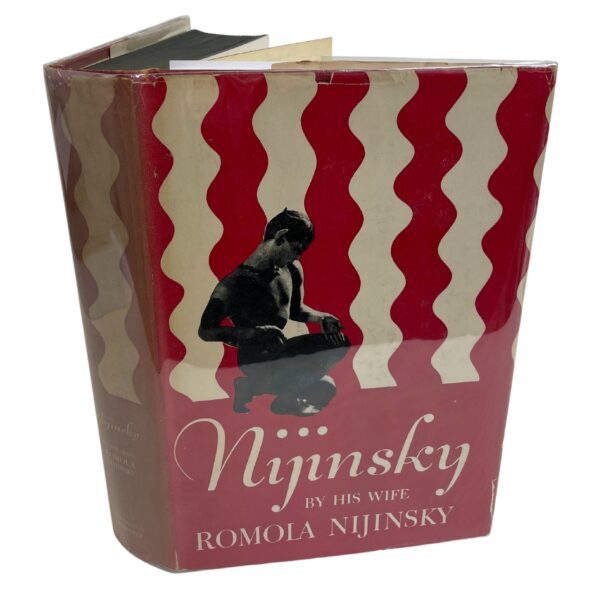
Nijinsky: By Romola Nijinsky, His Wife” – SIGNED
[Nijinsky, Waslaw. (1889-1950)] Nijinsky, NEE de Pulszky, Romola. (1891 - 1978) 8vo. 447 pp.17 photograph illustrations, index. Hardcover, red cloth in illustrated dustjacket, signed and inscribed by Romola Nijinsky on the first free endpage in blue ink: "To Marguerite Mc Bride / who is so wonderful + helpful / with my best wishes / Romola Nijinsky / 1952. New -York." Binding tight and very fine, a few pages with light corner creases, scarce dj with sunned spine and tears to edges, overall very good condition.An attractive signed copy of this controversial book, signed by the Hungarian heiress and dancer in Diaghilev's corps de ballet who won the affections of Vaslav Nijinsky on the company's 1913 sea voyage to South America, and by the time they landed in Buenos Aires, had convinced him to marry her! Upon receiving the news of the marriage, Diaghilev cabled Nijinsky to inform him that he was dismissed from the company. Severed from his personal and professional ties with the ballet, Nijinsky began his famous struggle with mental illness. Though he rejoined Diaghilev for a world tour, he retired in 1917 when he was diagnosed a paranoid schizophrenic.- $431
- $431
Signed Photograph
Lawrence, Gertrude. (1898â"1952) Signed candid photograph of the English-born actress looking upwards. 4 x 2.5 inches (10.2 x 6.3 cm). In very fine condition.From the collection of Paul McMahon, a critic, photographer and artist who worked for more than 13 years touring with Marlene Dietrich as the iconâs stage manager, announcer, dresser, secretary and escort, and later spent 25 years as an arts and entertainment reviewer and photographer with Gay Community News, Esplanade, Tommyâs Connection, The Mirror, Bay Windows and other publications.- $98
- $98
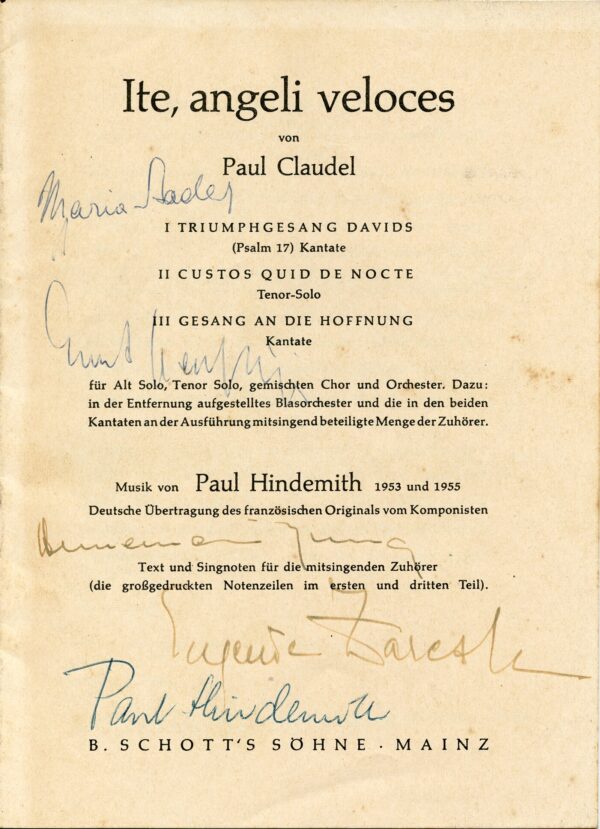
Ite, angeli veloces” – Signed Partbook
Hindemith, Paul. (1895-1963) Upright duodecimo. Staple-bound. Ite, angeli veloces von Paul Claudel. für Alt-Solo, Tenor-Solo, gemischten Chorus und Rochester. Dazu: in der Entfernung aufgestellten Blasorchester und die . an der Ausführung mitsingend beteiligte Menge der Zuhà rer. Text und Singnoten für die mitsingenden Zuhà rer (Text and partbook for the audience to join in). Mainz: B. Schott's Sà hne, 1955. 16 pp. German text only (translated by the composer). 7.5 x 5.5 inches (18.8 x 13.6 cm). Signatures of the composer, Maria Stader (1911-1999; Swiss soprano), Annemarie Jung (soprano), Ernst Haefliger (Swiss tenor, 1919-2007) and Eugenia Zareska (Polish mezzo soprano, 1910-1979) to first page. In fine condition.The musicians signing this copy participated in a performance of the work at the Lucerne Festival in 1956. See The Musical Times, October 1956, p. 546. The audience is supposed to sing the turba choruses, for which the present partbook was created. It includes the entire text of the work, the vocal parts for the audience, and cue notes leading up to the entrances. However, the parts intended for the audience are quite demanding, and even if the audience is led by professional "ringers," the success is questionable. In any case, this integration of the audience makes Ite, angeli veloces notable. As the composer explains in an extended note on p. 2, he created this work in collaboration with Claudel (1868-1955), and he regrets that Claudel died before its first performance.- $345
- $345
Signed photograph
Beach, Amy. (1867â"1944) Uncommon signed photograph of the American composer and pianist by Geo. G. Fraser Studios. Inscription in black ink,"For Miss Brower with kindest regards Amy M. Beach." 7.5 x 5.75 inches (19 x 14.8 cm). Low contrast inscription to a dark area of the image, lightly rippled from damp staining, with some silvering and a horizontal crease near foot, otherwise in good condition.The most prominent female composer of her time, Amy Beach was one of the first women composers to write in the larger forms and to receive genuine recognition abroad, and the first prominent American woman musician to receive all her training in the United States.- $259
- $259
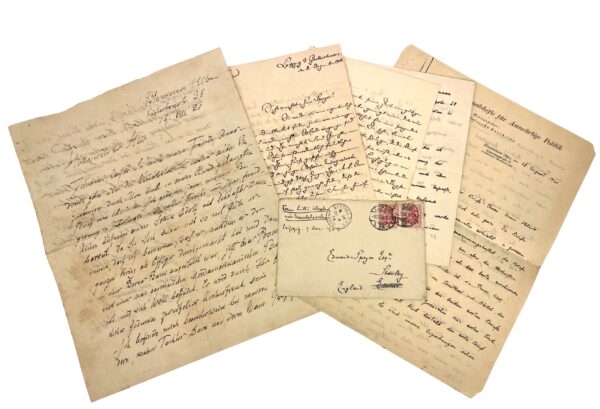
Collection of 4 Autograph Letters from the Mendelssohn Family to Edward Speyer
[Mendelssohn-Bartholdy, Felix. (1809â"1847)] An intriguing collection of 4 autograph letters signed from the composer's daughter, son-in-law, and grandson, all in German, and addressed to Edward Speyer. As follows:1. Lili Wach, nà e Mendelssohn Bartholdy (1845-1910), the composer's youngest daughter, to Edward Speyer in Shenley, England. Leipzig, December 8, 1908. 6 pp. 2 bifolia. With autograph envelope. Lili Wach writes at length about her youngest son Adolf jr., who was enrolled at Oxford University as an undergraduate, lived with the Speyers for a while, and now wants to embark on a business career, which is at odds with the Mendelssohn family tradition; at the same time, he would like to visit England again. She asks Speyer whether he could recommend her son to a business in London for an appointment. 7 x 5.5 inches (18 x 13.8 cm).2. Adolf Wach (1843-1926), the composer's son-in-law and husband of Lili Wach, to Edward Speyer, Blankenese [now Hamburg], August 16, 1921. 2 pp. 1 leaf. Wach writes from the home of his daughter Dora (Dorothea), who is married to her cousin Albrecht Mendelssohn Bartholdy (1874-1936). He again thanks Speyer for his support for the Wachs' youngest son, Adolf jr., while the latter was in England. Adolf sr. reports that his son was an officer in the First World War, then worked for a bank in Berne and now is general manager at a newly founded North American bank. Upper edge unevenly torn; small hole in the center. 11 x 8.5 inches (28 x 22 cm).3. Albrecht Mendelssohn Bartholdy (1874-1936), a grandson of the composer, to Edward Speyer. Blankenese [now Hamburg], August 28, 1921. 2 pp. 1 leaf. Stationary with letterhead of Hamburgische Monatshefte für Auswärtige Politik (Hamburg Monthly for Foreign Policy), a journal edited by Albrecht Mendelssohn Bartholdy. "I happily fulfill your request for manuscript copies of your father's [Wilhelm Speyer] letter to my grandfather [Felix Mendelssohn Bartholdy]. Like any writings received by my grandfather, these letter were bound in large folio volumes still under his supervision, which means that I cannot send you the letters themselves." In turn, Albrecht Mendelssohn Bartholdy asks Speyer for a manuscript copy of a letter in Speyer's possession from Mendelssohn's great-grandmother Elisabeth Wilhelmine Jeanrenaud (1796â"1871) that Speyer has mentioned before. Again, Albrecht Mendelssohn Bartholdy thanks Speyer for taking care of his brother-in-law Adolf Wach jr. "He works here in Hamburg, where the Mercantile Bank of the Americas maintains a major branch." 11 x 8.5 inches (28 x 22 cm).4. Albrecht Mendelssohn Bartholdy to Edward Speyer. Blankenese [now Hamburg], November 14, 1921. 2 pp. Bifolium. In full: "Dear Mr. Speyer, my sister-in-law in Leipzig [Lili Wach], whom I just met at a conference of the "Society of Friends" and questioned about the descendants of [Moritz] Hauptmann, thinks that a letter to Miss Helene Hauptmann, Salomonstrasse, Leipzig, would surely reach Hauptmann's daughter, who owns his archives. Miss Hauptmann also has a residence on the countryside, but the Leipzig address is safer. Whit the most devout regards Yours, Albrecht Mendelssohn Bartholdy." 6 x 7.5 inches (19 x 15 cm).Edward Speyer (1839â"1934) and his wife Antonia (nà e Kufferath, 1857â"1939) cultivated a center of musical life in their family estate of Ridgehurst in Hertfordshire, north of London, in 1894. Their circle included Carl Mozart, Rossini, Spohr, Mendelssohn, Liszt, Brahms, Joachim, Clara Schumann, and Elgar. Moritz Hauptmann (1792-1868) was a music theorist and composer. Felix Mendelssohn Bartholdy successfully recommended him as Kantor to St. Thomas Church in Leipzig in 1842, a position Hauptmann held until his death. From 1843 he also taught theory at Mendelssohn's conservatory in Leipzig, and in 1850 he was a founder member of the Bach-Gesellschaft as well as its first president. As to Mendelssohn's grandson Adolf Wach jr., we have been unable to confirm his life dates.- $1,380
- $1,380
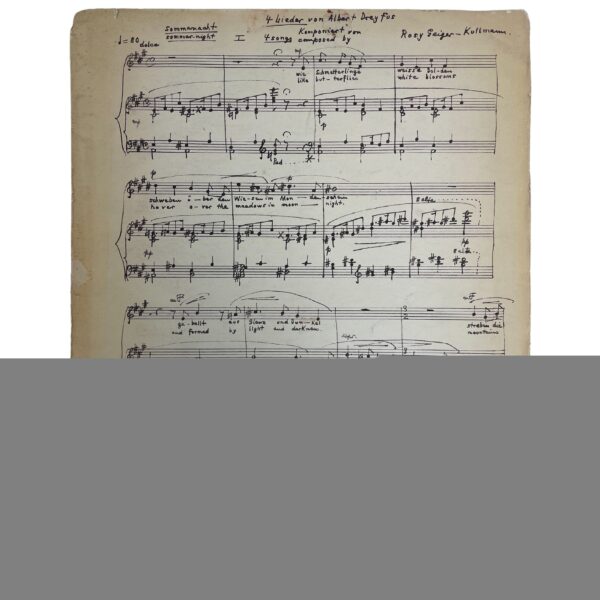
Two collections of songs for voice and piano – SIGNED
Geiger-Kullmann, Rosy. (1886-1964) Two facsimile autograph musical manuscripts, the first inscribed by the composer. As follows:5 Lieder nach Gedichten von Max Wertheim. For voice and piano. 10 pp. Maestro No. 105 music paper by Independent Music Publishers, New York, 12 staves to both sides. Bound in gray wrappers, with title to upper wrapper. Text in German and English. Inscription to unknown person to fol. 1r, "Aus den Blüten zieht ein Frieden in das schwergeprüfte Herz. Einen herzlichen Gruà von Ihrer Rosy Geiger-Kullmann." This is a quotation from the text of the first of the songs. 14 x 11 inches (35 x 28 cm). Significant staining along outer edge of the title page and to the wrapper, also frayed to outer edges. Small tears to pages of music, else very good. 4 Lieder von Albert Dreyfus. For voice and piano. Musical autograph. 10 pp. Maestro No. 105 music paper by Independent Music Publishers, New York, 12 staves but to one side only, glued back-to back. No wrappers/cover sheet; titling to head of first page of music. Text in German and English. 14 x 11 inches (35 x 28 cm). Minor stains and tears.5 Lieder nach Gedichten von Max Wertheim. For voice and piano. 10 pp. Maestro No. 105 music paper by Independent Music Publishers, New York, 12 staves to both sides. Bound in gray wrappers, with title to upper wrapper. Text in German and English. Inscription to unknown person to fol. 1r, "Aus den Blüten zieht ein Frieden in das schwergeprüfte Herz. Einen herzlichen Gruà von Ihrer Rosy Geiger-Kullmann." This is a quotation from the text of the first of the songs. 14 x 11 inches (35 x 28 cm). Wrappers frayed to outer edges. Small tears to pages of music.Rosy Geiger-Kullmann, nà e Dreyfuss, daughter of a Jewish family in Frankfurt, composed prolifically in a traditional idiom. Her most important teacher and champion before 1933 was the conductor Carl Schuricht. She emigrated from Germany in 1939 and settled in New York City in the following year. She spent her final years with her daughter in Monterey, CA. The two present sets of songs were composed in 1946 and 1947. The composer dedicated another copy of the Wertheim songs to her son, Herman Geiger-Torel (1907-1976), who co-founded the Canadian Opera Company in Toronto and directed it for many years, on the occasion of his 40th birthday (July 13, 1947). See https://www.lexm.uni-hamburg.de/object/lexm_lexmperson_00001241 (in German). No further information is available about the authors of the texts.- $173
- $173
Compilation of Spanish Songs – RUSSIAN EDITION WITH OWNERSHIP SIGNATURE OF PAUL ROBESON
Robeson, Paul. (1898-1976) "Sheet music of "Compilation of Spanish Songs" ("СбоÑнРк Ð ÑпанÑÐºÐ Ñ Ð¿ÐµÑен / Sbornik ispanskikh pesen") printed in Cyrillic, the text translated to Russian from Spanish by Gr. Gnesin, with the ownership signature in green ink "Paul Robeson" at the head of the front wrapper. Small upright folio, 12 x 8 1/2 inches (30 x 22 cm). 40 pp. The cover dust soiled and with marginal chips, pages heavily toned and with small nicks and tears around edges. This music dates from around the time Paul Robeson visited Moscow, and of Russia he said "Here I am not a Negro but a human being for the first time in my life . I walk in full human dignity." Such items relating to Robeson's time in the Soviet Union are scarce."- $690
- $690
1833 London Concert Advertisement: https://rarebookinsider.com/rare-books/1833-london-concert-advertisement/
